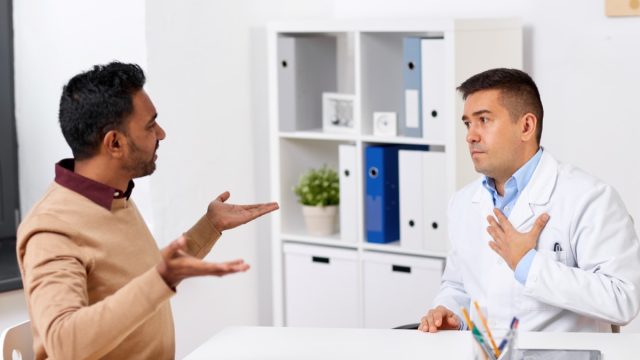5 Doctor Red Flags That Mean You Should Find Another GP
We asked a doctor and a patient advocate what signs to look for.

We all need service people in our lives we can trust, whether they're cutting our hair or fixing our cars. But out of all those we hire to care for us, perhaps no one is more important than our doctor, also known as our primary care provider (PCP) or general practitioner (GP). Since our lives may be quite literally in their hands, having one we can depend on is crucial.
"You want to find someone who is compassionate and caring, and who is willing to work with you on the goals that you have for your wellness," physician and consultant Laura Purdy, MD, tells Best Life.
We asked Purdy, along with Teri Dreher, RN, the owner and CEO of North Shore Patient Advocates and a board-certified patient advocate, how to know it's time to move on from your current GP—and how to find a better one.
"Doctor-locating sites like Healthgrades or Zocdoc should be taken with a grain of salt, as they can be curated, biased, or [have] poor reviews removed," Dreher says regarding the latter. And, she adds, even a five-star review may not mean much. "Stars are not a great indicator, as they can be self-reported," she shares.
A better strategy? "Ask around to your friends and family and see if someone has recommendations," suggests Purdy. "People who love their PCP will often be willing to recommend them to other people."
But how do you know it's time to start shopping for a new doc? Read on for five red flags Purdy and Dreher say are clear indicators that a change is needed.
READ THIS NEXT: 4 Scary Symptoms That Are Usually False Alarms, According to Doctors.
1
The office staff is unfriendly.

We've probably all experienced the frustration of dealing with a front desk receptionist who doesn't seem to listen to us, or a nurse's aide who knocks on the door less than a minute after asking us to change into a paper gown. But even though they may be common, rudeness and impatience shouldn't be dismissed as a routine part of a doctor's office visit.
No matter how much you may like your actual healthcare provider, Dreher says an unfriendly staff is a good enough reason to walk away, noting that "poor quality or rude office staff, [or] no follow-through on commitments made" are unacceptable.
2
You don't feel comfortable sharing your concerns.

"A good primary care physician should be a combination of skill and experience [along with] good communication and people skills," says Dreher.
Purdy elaborates, saying, "It is important that primary care doctors are accessible, available, open, compassionate, non-judgmental, and supportive. This doesn't necessarily mean that your doctor has to do every single thing you ask them to do, but they should be willing to have a conversation with you about what your priorities are, and what is bothering you the most. They should be willing to at least have a dialogue and engage and share in decision-making to help determine what is the best outcome for you."
READ THIS NEXT: 5 Questions Your Pharmacist Wishes You'd Ask Before Taking Statins.
3
Your messages aren't answered in a timely fashion.

This one, which Dreher lists as a red flag, can be extremely frustrating. After all, if you're not feeling well, or have a question about your medical care, you don't want to wait around for a response.
If your phone calls, emails, and patient portal messages "are not answered by the end of the day, or not answered at all," Dreher says, it's time to move on. (And while we're on the subject, it's worth asking whether your doctor charges for answering emails.)
4
You're given incorrect prescriptions.

When we pick up a new medication at the pharmacy, most of us don't think twice about whether or not it's safe to take. If our doctor prescribed it, and the pharmacist filled it, then it must be OK, right? Unfortunately, that's not always the case.
"Each year, in the United States alone, 7,000 to 9,000 people die as a result of a medication error." That's according to a National Library of Medicine report on medication dispensing errors and how to prevent them.
Dreher confirms that this is something to watch for, saying that "medications that interfere with present medications," along with prescriptions for the wrong medicine, are a tell-tale sign that you need a new PCP urgently.
For more health advice sent directly to your inbox, sign up for our daily newsletter.
5
You have a gut feeling that it's time for a change.

"The number one sign that you need to find a new PCP? If you feel like you need to find a new PCP, then you do!" says Purdy, who encourages us to follow our instincts.
"If you find that your doctor takes a long time to get back to you, isn't willing to hear your concerns, doesn't take the time to develop a good rapport with you, and doesn't treat you like you're the only patient in the world, take that as a sign that it may be time for you to look elsewhere," she advises.
And Dreher agrees, saying that if "your intuition tells you that your doctor is too rushed, burned out, or not focused enough on providing the best care to you," then you're better off finding someone else.





















